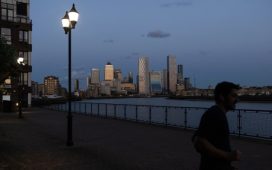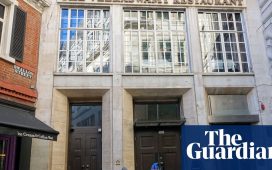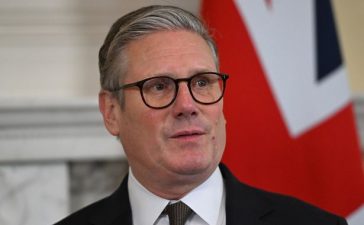Unlock the Editor’s Digest for free
Roula Khalaf, Editor of the FT, selects her favourite stories in this weekly newsletter.
The chief executive of HSBC said he believed China’s property sector has hit its lowest ebb and can begin to recover, even as banks take hundreds of millions of dollars in charges over their exposure to a crisis in the sector.
Speaking as the bank announced its third-quarter earnings, which included a $500mn provision related to commercial property in mainland China, Noel Quinn said Beijing’s most dramatic actions to rein in excesses in the industry were over.
“If you look at the policy correction that took place . . . they went very deep and hard over a short period of time,” he said. “The sector itself has bottomed and it now has to recover from that new lower position.”
“Does that mean that there aren’t any further issues to emerge? No, there’s always a risk of some developers having further problems,” Quinn added.
China’s real estate sector tipped into crisis two years ago when the heavily indebted developer Evergrande defaulted.
HSBC has twin bases in the UK and Hong Kong, which gives it closer ties to China than other western banks. It has $13.6bn in total exposure to commercial real estate in the country.
Last week, HSBC’s smaller rival Standard Chartered announced higher than expected charges, largely due to its China exposure, causing its shares to tumble.
Separately, HSBC on Monday announced a further $3bn in share buybacks as it continued to benefit from higher global interest rates.
The London-listed lender reported pre-tax profit of $7.7bn, less than the $8.1bn analysts had estimated due to higher than expected costs, though still far greater than the $3.2bn profits of a year earlier. The shares rose 0.7 per cent.
“We have had three consecutive quarters of strong financial performance,” said Quinn, adding that the bank’s “good broad-based growth” was “supported by the interest rate environment”.
The latest buyback means HSBC has pledged to repurchase $7bn of stock this year and paid three quarterly dividends of 10 cents a share. The returns to shareholders have addressed a key concern of its largest investor, Chinese insurer Ping An, which had been agitating for the group to break itself up to improve shareholder returns.
Ping An suspended its campaign after other shareholders rejected its proposals at the bank’s annual meeting in May.
HSBC, one of the world’s largest banks with $3tn of total assets and $1.6tn of customer deposits, has been a big winner from higher interest rates, which have helped it earn more on the difference between what it pays on deposits and what it charges to lend.
HSBC did make some strategic concessions in the wake of Ping An’s challenge, and is close to selling businesses in several countries on the periphery of its network. The $10bn sale of its Canada unit to Royal Bank of Canada, and the disposal of its French retail business to US private equity group Cerberus, are both due to be completed early next year.
Georges Elhedery, HSBC’s chief financial officer, said on Monday that the bank would “continue to look at our portfolio” and “assess what aligns to the value of our network”.
However, he signalled that large-scale sell-offs were unlikely, saying: “Do not expect anything the size of Canada going forward.”
Andrew Coombs, an analyst at Citi, said the buyback was “encouraging”, but noted that expenses were set to rise more than anticipated because of technology investments and integration costs related to the rescue of Silicon Valley Bank UK in March.
HSBC said it would consider boosting bonuses to reward staff, which would increase costs by about 1 per cent. Elhedery said rising prices and inflation had “been a difficult pressure and beyond what we had expected”.
HSBC makes the lion’s share of its profits in Asia. It has increased its presence in China, agreeing this month to buy Citi’s wealth management business in the country as it seeks to become Asia’s biggest wealth manager.
Its net interest margin, a crucial measure of lending profitability, edged down to 1.7 per cent, two basis points lower than the previous quarter. The bank said this was because some customers were choosing to lock their money away in term deposits in order to get higher interest payments.








